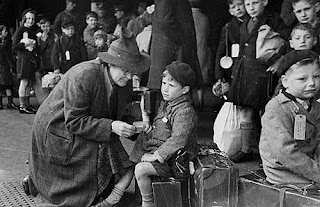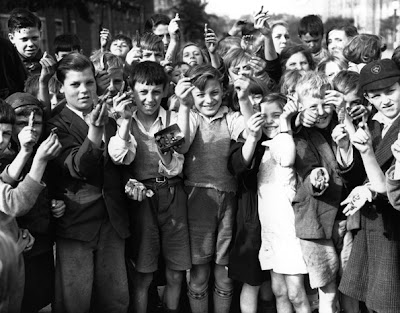I wanted to include some of Momma's overall impressions of the war. Remember she was 12 when the war started and 18 when it ended. --Mom
"In the midlands, we did not suffer from the bombing like those in the coastal towns and in London. Sometimes a stray bomb would fall in some nearby field, and all us kids would troop out to look at the crater and search for shrapnel. After an air raid, the ground would be peppered with strips of foil, which the Germans would drop to confuse the British radar and protect their aircraft."
--Joan Shelton
Bit of history: Chaff is a radar countermeasure in which aircraft or other targets spread a cloud of small, thin pieces of aluminium, metalized glass fibre or plastic, which either appears as a cluster of secondary targets on radar screens or swamps the screen with multiple returns.
"I think what upset me the most during the war was hearing the radio broadcasts and seeing the newsreels of ships being sunk, the terrible loss of life, and the evacuation of British children to the countryside to avoid the bombing in the cities. It was heart wrenching to see the faces of the parents left behind and to see both parents and children crying. Some of the parents were killed later in the bombings." --Joan Shelton

Bit of history: The evacuation of Britain's cities at the start of World War Two was the biggest and most concentrated mass movement of people in Britain's history. In the first four days of September 1939, nearly 3,000,000 people were transported from towns and cities in danger from enemy bombers to places of safety in the countryside.
Most were schoolchildren, who had been labeled like pieces of luggage, separated from their parents and accompanied instead by a small army of guardians - 100,000 teachers. By any measure it was an astonishing event, a logistical nightmare of co-ordination and control beginning with the terse order to 'Evacuate forthwith,' issued at 11:07 am on Thursday, 31 August, 1939. Few realized that within a week, a quarter of the population of Britain would have a new address
 |
| the B17 Flying Fortress |
When I was a teen, dances were held on the lawn in the park and as the planes flew over filling the sky, the Army band would play, "Silver Wings in the Moonlight" and "Coming in on a Wing and a Prayer", both popular songs then." --Joan Shelton


"We were encouraged to bring all metal such as old saucepans and other things that we could manage without and turn them in for the war effort. The government even took down all wrought iron gates and fences around buildings, all for the war effort. We learned after the war that it was done to keep up the moral of the people, so they would think they were serving the war effort. Don't know whatever happened to all that scrap metal." --Joan Shelton
Bit of history: "Gas had been used a great deal in the First World War and many soldiers had died or been injured in gas attacks (including Joe Shelton, my grandfather). Mustard gas was the most deadly of all the poisonous chemicals used during World War I. It was almost odorless and took 12 hours to take effect. It was so powerful that only small amounts needed to be added to weapons like high explosive shells to have devastating effects. There was a fear that it would be used against ordinary people at home in Britain."
By September 1939 some 38 million gas masks had been given out, house to house, to families. They were never to be needed. Everyone in Britain was given a gas mask in a cardboard box, to protect them from gas bombs, which could be dropped during air raids.
Children had to take regular gas drills at school. They found these drills hard to take seriously, especially when they discovered blowing out through the rubber made 'rude' noises!












